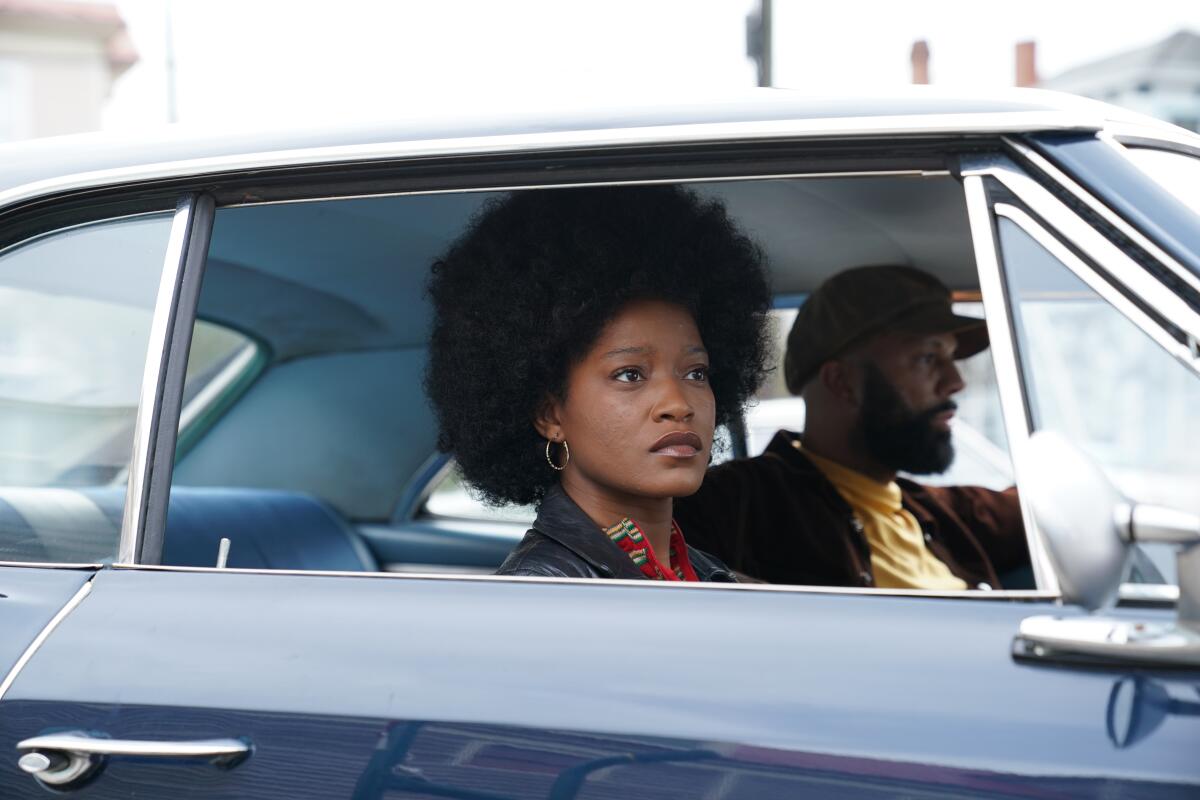A superb Keke Palmer keeps underdeveloped ‘Alice’ mostly on track

- Share via
There’s a touch of “The Handmaid’s Tale” and a bit of “The Village” evident in “Alice,” a revenge thriller with an unusual premise. Written and directed by Krystin Ver Linden, the film uses images from 19th century American slave plantations and 20th century Black liberation movements as the foundation for a 1970s-style action picture. While Ver Linden’s ideas never quite coalesce, “Alice” is at least consistently challenging.
Keke Palmer gives a superb performance as the title character, who toils as a “domestic” on a Georgia plantation, where she and her fellow servants — all enslaved — are treated cruelly by the land’s owner, Paul (Jonny Lee Miller). When Alice is pushed too far, she escapes … only to discover that she’s actually living in the year 1973.
For your safety
The Times is committed to reviewing theatrical film releases during the COVID-19 pandemic. Because moviegoing carries risks during this time, we remind readers to follow health and safety guidelines as outlined by the CDC and local health officials.
Ver Linden spends roughly the first third of “Alice” — the weakest third — scrutinizing plantation life. To preserve its big twist (revealed in the film’s trailer), the movie sticks with a fairly conventional slave narrative, dropping in only a few hints that something is off. It’s a missed opportunity to engage more fully with the question of how and why Paul preserves the illusion of the antebellum South.
After Alice escapes, she meets a truck driver named Frank, played by Common (who is also responsible for the film’s excellent soundtrack, reminiscent of lush ’70s R&B). As Frank tries to help this woman who has no last name, no address and no familiarity with modern technology or mores, “Alice” settles into its most effective section. Ver Linden’s decision to set the movie in 1973 proves especially inspired here, since this was a time when Black Americans were emerging as a cultural and political force while still facing the headwinds of oppression.
Filmmaker Krystin Ver Linden took inspiration from true accounts of modern-day slavery and blaxploitation cinema to craft the Sundance premiere “Alice,” starring Keke Palmer.
For the movie’s final third, though, Ver Linden shifts again to something less original, as a vengeful, gun-toting Alice — inspired by Pam Grier movies — heads back to the plantation. To get to that climactic action sequence, Alice’s character becomes a whole other person incredibly quickly; and in the process a lot about her journey to self-determination gets lost.
Still, even when “Alice” doesn’t work, it remains gripping. Ver Linden underdevelops her “what if” scenario, but thanks in large part to Palmer the film is a fascinating character study, about a woman who moves abruptly from a society where she had to settle for a drawing of Anna Karenina in a book as an aspirational image to a world where she sees Diana Ross on the cover of “Rolling Stone.” At its best, this movie is a portrait of what real change looks like — and a call to keep going.
'Alice'
Rated: R, for some violence and language
Running time: 1 hour, 40 minutes
Playing: Starts March 18 in general release
More to Read
Only good movies
Get the Indie Focus newsletter, Mark Olsen's weekly guide to the world of cinema.
You may occasionally receive promotional content from the Los Angeles Times.











